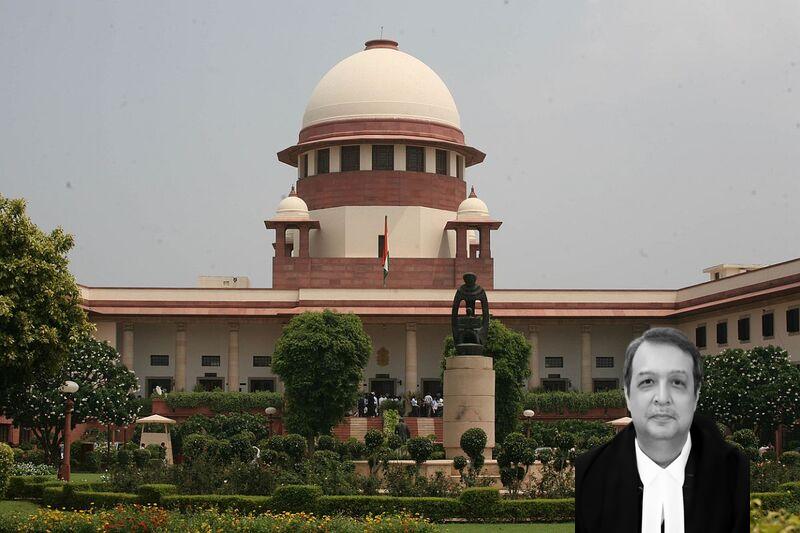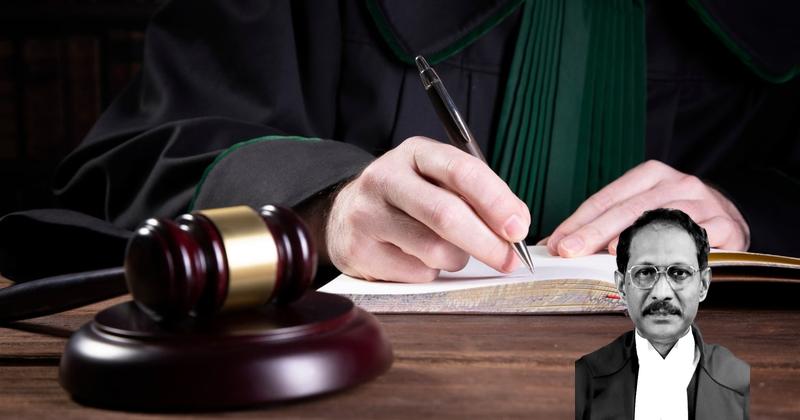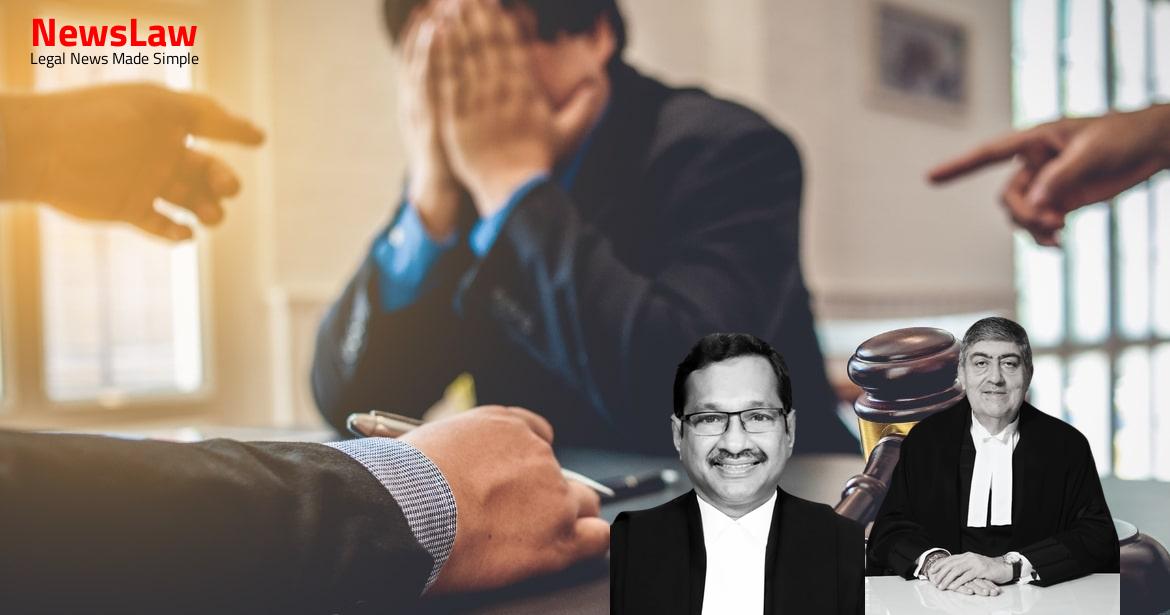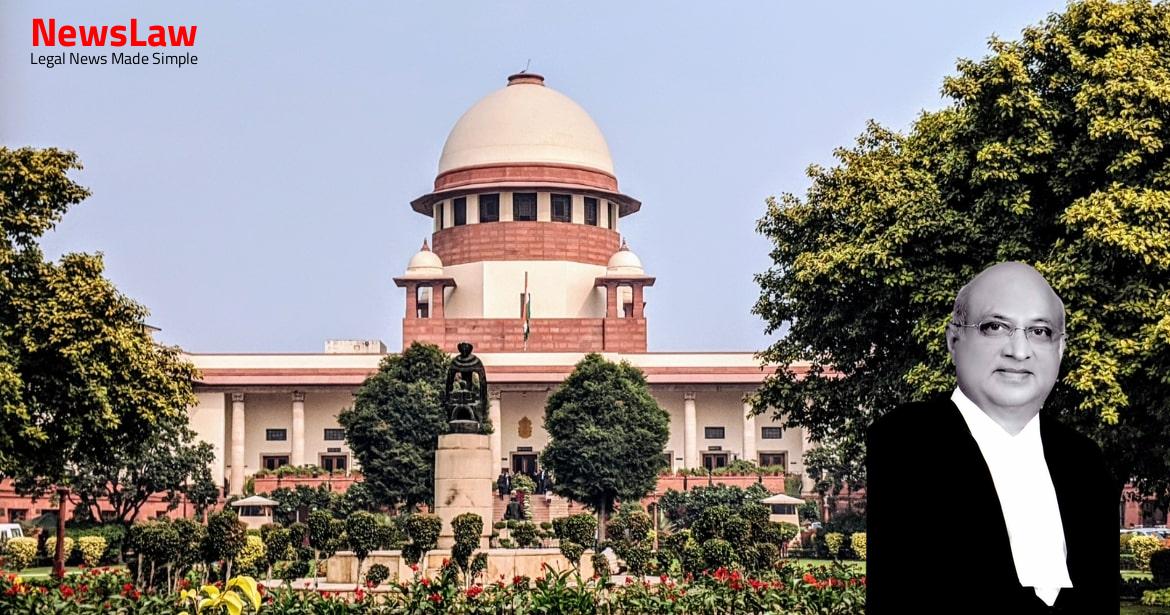Whether the Central Complaints Committee based its findings on conjectures and surmises? Sexual harassment in any form at the work place must be viewed seriously and the harasser should not be allowed to escape from the clutches of law. When a plea is taken of false implication for extraneous reasons, the courts have a duty to make deeper scrutiny of the evidence and decide the acceptability or otherwise of the accusations. She lodged a complaint (hereinafter referred to as the “ first complaint ”) addressed to the Inspector General (for short, “IG”), Frontier Headquarters, Guwahati with one copy each forwarded to the DG SSB, New Delhi, Dy.
Even he went to the extent of visiting my residence where I stay alone with two of my children as my husband is a state Government employee in Manipur. I could neither inform my husband nor lodge any written complaint against such acts as it will be difficult to give evidence. Since then, he stopped teasing but instead began torturing me mentally. Office, SSB Rangia” Page 6 of 104 A.1 On-Spot/Preliminary Inquiry Report 4. IG, SSB, SHQ, Tezpur held a common “on-the-spot” fact finding inquiry in relation to the first complaint dated 30.08.2011 and recorded the statements of the employees working in the office of the respondent. X, FA(Lady), Shri Dilip Paul, Area Organiser, is found to have failed to motivate her and get work from her. The said report reads as under: – Page 8 of 104 “To The Inspector General, Frontier Hqrs. I obtained their statements individually and on the basis of the interaction with each of them; I opine as follow: i) From the statements of the staff it is observed that Shri Dilip Paul, Area Organiser sometimes shout to some of the staff in the office, for the purpose of official work only. v)
On the basis of statement given by each staff and from the para- wise reply given by the Area Organiser, it is observed that there is no evidence regarding use of unnecessary slang language by the Area Organiser, to his sub-ordinate staff but at times he used to be rude to get the work done within the time limit, from some of the subordinate staff. The Frontier Complaints Committee upon completion of the inquiry, submitted its report dated 17.01.2012 to the Frontier Headquarters SSB, New Delhi through the IG, Guwahati, stating that the allegations levelled by the complainant could not be said to have been fully established or proved. While the Frontier Complaints Committee’s Report dated 17.01.2012 was pending for consideration, the Ministry of Home Affairs / Competent Authority, constituted another inquiry committee on 06.08.2012 being the Central Complaints Committee to conduct an appropriate inquiry into the complainant’s allegations of sexual harassment. Clause 9 of the 2006 Standing Order envisages two levels of complaints committee; (i) a Frontier Complaints Committee for the “combatised and in-field officers” (ii) a Central Complaints Committee for the “non-combatised officers”.
After, confirming with the respondent as regards the receipt of all relevant documents, the Central Complaints Committee inquired with the respondent whether he pleaded guilty to the charges or not. The CCS CCA Rules require the fact that the approach and objective in the criminal and disciplinary proceedings are altogether distinct and different, be kept in view, as is laid down by the various Supreme Court rulings to this effect. Point 1: That Shri Dilip Paul would use the pretext of summoning into his room with work-related files in order to make comments of a sexually loaded and personal nature, such as remarks about her personal appearance and her looks, about how he wanted to marry a Manipuri girl like her. This charge, if substantiated, is admissible under the Vishaka definition of sexual harassment as it involves sexually coloured remarks and other unwelcome physical, verbal or non-verbal conduct of sexual nature. X believed that her objection to Shri Dilip Paul’s conduct would disadvantage her in connection with her employment and her apprehension that if would create a hostile work environment. Koi baat nahin, tum study tour se waapas aa jaaoo, to tum Mrs Paul banogi.” Point 7: That Shri Dilip Paul made unwelcome sexual advances to her outside the workplace as well, where on several occasions, he propositioned her, asking her to leave her husband and marry him on the assurance that he would adopt her children as his own. That Shri Dilip Paul used to make unsolicited phone calls to her, frequently at night and insisted on speaking to her for long durations, sometime up to half and hour. The phone calls were usually made between 19:00 and 20:00 hours, but occasionally, she also received calls from Shri Dilip Paul as late as 4.30 a.m.
X’s home, Shri Dilip Paul came with a bottle of alcohol and sought to pressure her to join him in drinking. That when Shri Dilip Paul visited her house one evening in April 2010, shortly after her return from the Study Tour to South India, he made unwelcome sexual advances to her by his statement that they would become one in a few days time and that she should stop resisting. Point 8: That Shri Dilip Paul began victimising her for her refusal to submit to his unwelcome sexual advances soon after he learnt that she had made a complaint about his misconduct to Shri S.C. Shri Singhal asked her to separate the two complaints of sexual harassment in the workplace from the transfer request and issued an order transferring her to Ftr Hqr Guwahati on 1 Page 16 of 104 September 2011. In her deposition as well as the written submissions made to the Complaints Committee, she also pleaded that due cognizance be taken of the fact that, as a woman employee of the SSB, she was entirely unaware of that a Complaints Committee mechanism for dealing with complaints of sexual harassment was in place, and that as a complainant, she had the right to submit a request for either her own transfer or the transfer of the defendant. Clause 9(1) of the 2006 Standing Order mandates that the chairperson of the inquiry committee must be senior in rank to the delinquent / charged officer and reads as under: – “ 9. X, FA (LADY) FTR HQR GUWAHATI AGAINST SHRI D.PAUL, AO RANGIA NOW DIG, FTR HQR SILIGURI (.) IT IS OBSERVED THAT AS PER SOP ON SEXUAL HARASSMENT THE CHAIRPERSON OF THE INQUIRY SHALL BE ONE RANK ABOVE OF THE GOVT. The Central Complaints Committee submitted its inquiry report on 28.12.2012 to the Ministry of Home Affairs, wherein after recording its findings on the aforesaid 10 points, held the charges of sexual harassment against the respondent to have been proved. That Shri Dilip Paul be given exemplary punishment for his sustained sexual harassment of Smt. the respondent was provided with the Central Complaints Committee’s Inquiry Report and was asked by the Disciplinary Authority to submit his reply / written representation, which was submitted by him on 30.01.2013. AND WHEREAS, the Chairman of the complaint committee had handed over the complaint of sexual harassment dated 30.08.2011 submitted by the Complainant to Shri Dilip Paul, DIG during the course of 1 hearing of enquiry held on 26.09.2012 at New Delhi. That the said Shri Paul on one pretext or the other used to make personal contact with her body.
AND WHEREAS, a copy of enquiry report after its acceptance was served upon the Charged Officer, Shri Dilip Paul, DIG for making his representation vide Memo No.14/SSB/Pers- 1/2013(1)/437-39 dated 16.01.2013. AND WHEREAS, Charged Officer Shri Dilip Paul, Ex-DIG had filed an OA No 181/2013 before the Hon’ble CAT Guwahati Bench challenging there under constitution of Central Complaint Committee and its report dated 28.12.2012. After the disposal of the case by the Hon’ble CAT and vacation of the interim directions of the Hon’ble Court, a copy of UPSC advice dated 22.08.2013 was served upon the Charged Officer vide Memorandum No.14/SSB/Pers-1/2013(1)/9923-24 dated 04.08.2015, which was duly acknowledged by the Charged Page 22 of 104 Officer. ACCORDINGLY, the aforesaid penalty is hereby imposed upon Shri Dilip Paul, Ex-DIG who had superannuated on 31.03.2013. It is the case of the respondent that the complainant had preferred one application in August, 2011 with a request to transfer her from the Rangia Office to the Frontier Headquarter Guwahati. The respondent preferred OA No 181 of 2013 before the Central Administrative Tribunal, Guwahati (CAT), assailing (i) the constitution of the Central Complaints Committee vide order dated 06.08.2012 (received via fax dated 03.09.2012), (ii) cancellation of the Frontier Complaints Committee’s Inquiry Report vide order dated 30.11.2011 (received via Memorandum dated 10.12.2012 Page 24 of 104 of the Frontier, Headquarters, SSB, Guwahati) and the (iii) Central Complaints Committee’s Inquiry Report dated 28.12.2012.
The CAT, Guwahati vide its final judgement & order dated 03.07.2015 dismissed the said OA No 181 of 2013 observing that the Frontier Complaints Committee had not been constituted as per the 2006 Standing Order, and as the disciplinary proceedings were still pending, it refrained from expressing any opinion in regard to the Central Complaints Committee’s Inquiry (except expressing some reservations on the issue of penalty recommended therein) and directed that the disciplinary proceedings be completed within 4-months. We have given our thoughtful consideration in the matter by taking into account the entire conspectus of the case, to the conclusion on the point that the consideration of Central Complaints Committee as per law laid down and in terms of the guidelines which has been duly followed by the department by taking care of the earlier observation by giving our view that the Frontier Level Standing Committee findings was not as per SOP reason as already given. During the pendency of the said writ petition, the Ministry of Home Affairs vide its Order dated 05.01.2016 referred to above held that the charges of sexual Page 26 of 104 harassment levelled against the respondent stood duly proved and after due consideration of the respondent’s representation and the advice of the UPSC imposed a penalty of withholding 50% of the monthly pension on permanent basis. In other words, the High Court allowed the writ petition and set aside the order of penalty on three grounds: – (i) First, the High Court took the view that the Central Complaints Committee was constituted by the competent authority to inquire into only the first complaint dated 30.08.2011, however, the Central Complaints Committee during the course of its inquiry also looked into the allegations levelled in the second Complaint dated 18.09.2012 which it could not have.
Charges which were admitted/dropped/not pressed” that the petitioner did not plead guilty to any of the allegations made by the complainant in her complaint dated 30.08.2011. Two inquiries had also taken place and, after more than a year later, after lodging of the complaint dated 30.08.2011, another complaint with many allegations was submitted to the Chairperson of the CCC on 18.09.2012. Perusal of the order-sheets, more particularly, the orders dated 26.11.2012, 27.11.2012, 28.11.2012 and 10.12.2012 go to show that the committee asked questions to the prosecution witnesses and examination-in-chief was done by, the committee.
When his evidence was that there was no complaint of sexual harassment, there was no occasion for the CCC to opine that he pre-judged the complaint. With regard to Point No 7(a), the CCC had recorded that it had noted that no witness examined by it had specific knowledge of the events listed in, wrongly recorded as 5(a) – (f). It is submitted that the Central Complaints Committee was constituted to look into the allegations made against the Respondent as prescribed under Rule 14 of the Central Civil Services (Classification, Control and Appeal) Rules, 1965.
When the Respondent was enquired about the name of his counsel, he submitted before the Committee that he will represent himself and cross-examine the witnesses and he himself examined as many as 11 witnesses. The allegation made by the Respondent that the Complainant submitted a list of witnesses later on 18.09.2012, which the Committee could not look into is misconceived. Page 31 of 104 Therefore, this was not a case of “no opportunity” or “no hearing” but a case of “adequate opportunity” and “fair hearing” afforded to the appellant before imposing a penalty of withholding 50% pension amount. However, the same was cancelled by Memorandum dated 10.12.2012 on the ground that the Chairperson of the FLCC was not an officer who was senior to the petitioner against whom the complaint was made as required under Rule 9(b)(a) of the Departmental Standard Operating Procedure on Sexual Harassment.
It is submitted that this Hon’ble Court in a number of cases has held that the High Court while exercising its powers under Article 226 would not interfere with the quantum of punishment unless it shocks the conscience of the court. In such circumstances, it is submitted that the punishment imposed by the disciplinary authority for withholding 50% of monthly pension is proportionate to the offence committed by the Respondent.” D.
But in the instant case, in spite of the fact that the sole respondent was exonerated from the alleged complaint by three successive enquiries i.e. i) the Fact Finding enquiry, ii) first the statutory enquiry conducted by the duly constituted Frontier Level Committee and iii) a second statutory enquiry (in fact it was 4th enquiry in the series which includes inquiry on the basis of another anonymous complaint) by the Central Complaint Committee was instituted. Incorporating therein the newly added exaggerated versions of the complainant and delved into those, thus travelling beyond the allegations in the complaint dated 30.08.2011 and overstepping its jurisdiction in violation of procedure laid down in CCS (CCA) Rules, 1965. The Hon’ble High Court rightly held that the Central Complaint Committee (CCC) was mandated by the authority to inquire into the complaint dated 30.08.2011. That, the Hon’ble High Court at para 43 of its judgment ( Page 70-71 of the SLP) rightly held that few points of allegations are no way connected to the complaint dated 30.08.2011. The Hon’ble High Court held that two inquiries had also taken place and, after more than a year later, after lodging of the complaint Page 35 of 104 dated 30.08.2011, another complaint with many allegations was submitted to the Chairperson of the CCC on 18.09.2012.
That, the Hon’ble High Court at para 46 of its judgment ( Page 74 of the SLP) rightly held that the prosecution witnesses were also put questions by the CCC, which is evident from the report of the CCC under the heading “V. In this regard, the Hon’ble High Court correctly held that the Central Complaint Committee (CCC) ought to have recorded its finding based on evidence on record and not on surmises and conjectures. The sole respondent is still deprived of his retiral benefit like gratuity and others as the gratuity due to him cannot be withheld as the nature of allegation is not related any financial issues and there was no order by any quarter about any such withholding of his retiral benefit. The sole respondent was the unfortunate victim of interdepartmental rivalry and he was traumatized due to unproved allegations and his innocence was upheld time to time by the first Page 37 of 104 three inquiries and same was discussed in detail by the Hon’ble High Court at para 40, 43, 46 and 47 of the impugned judgment while rightly setting aside the impugned order of penalty. Whether the Central Complaints Committee committed any egregious error in putting questions to the witnesses in the course of the departmental enquiry and thereby vitiating the disciplinary proceedings?
The turning point against the growing social menace of sexual harassment of women at work place could be traced back to the pathbreaking decision of this Court in Vishaka and Others v. The present petition has been brought as a class action by certain social activists and NGOs with the aim of focusing attention towards this societal aberration, and assisting in finding suitable methods for realisation of the true concept of “gender equality”; and to prevent sexual harassment of working women in all work places through judicial process, to fill the vacuum in existing legislation. The incident reveals the hazards to which a working woman may be exposed and the depravity to which sexual harassment can degenerate; and the urgency for safeguards by an alternative mechanism in the absence of legislative measures. When, however, instances of sexual harassment resulting in violation of fundamental rights of women workers under Articles 14, 19 and 21 are brought before us for redress under Article 32, an effective redressal requires that some guidelines should be laid down for the protection of these rights to fill the legislative vacuum. This is implicit from Article 51(c) and the enabling power of the Parliament to enact laws for implementing the international conventions and norms by virtue of Article 253 read with Entry 14 of the Union List in Seventh Schedule of the Constitution.
The executive power of the Union is, therefore, available till the Parliament enacts legislation to expressly provide measures needed to curb the evil.” (Emphasis supplied) 34. In view of the above, and the absence of enacted law to provide for the effective enforcement of the basic human right of gender equality and guarantee against sexual harassment and abuse, more particularly against sexual harassment at work places, we lay down the guidelines and norms specified hereinafter for due observance at all work places or other institutions, until a legislation is enacted for the purpose. Definition For this purpose, sexual harassment includes such unwelcome sexually determined behaviour (whether directly or by implication) as: a) physical contact and advances; b) a demand or request for sexual favours; c) sexually coloured remarks; d) showing pornography; e) any other unwelcome physical, verbal or non-verbal conduct of sexual nature. Preventive Steps: All employers or persons in charge of workplace whether in the public or private sector should take appropriate steps to prevent sexual harassment.
Page 43 of 104 In particular, it should ensure that victims, or witnesses are not victimized or discriminated against while dealing with complaints of sexual harassment. Complaint Mechanism: Whether or not such conduct constitutes an offence under law or a breach of the service rules, an appropriate complaint mechanism should be created in the employer’s organization for redress of the complaint made by the victim. The employers and person-in-charge will also report on the compliance with the aforesaid guidelines including on the reports of the Complaints Committee to the Government department. Union of India and Others reported in (2013) 1 SCC 297, decided on 19.10.2012, wherein this Court anguished by the failure of the Union & State Page 45 of 104 Governments in complying with the Vishaka guidelines, more particularly, the constitution of the complaints committee, issued a writ of continuing mandamus to ensure due compliance of the guidelines. We are of the considered view that the existing laws, if necessary, be revised and appropriate new laws be enacted by Parliament and the State Legislatures to protect women from any form of indecency, indignity and disrespect at all places (in their homes as well as outside), prevent all forms of violence— domestic violence, sexual assault, sexual harassment at the workplace, etc.—and provide new initiatives for education and advancement of women and girls in all spheres of life.
The States and Union Territories which have not yet carried out adequate and appropriate amendments in their respective Civil Services Conduct Rules (by whatever name these Rules are called) shall do so within two months from today by providing that the report of the Complaints Committee shall be deemed to be an inquiry report in a disciplinary action under such Civil Services Conduct Rules. Those States and/or Union Territories which have formed only one committee for the entire State shall now form adequate number of Complaints Committees within two months from today. Similarly, the Medical Council of India, Council of Architecture, Institute of Chartered Accountants, Institute of Company Secretaries and other statutory institutes shall ensure that the organisations, bodies, associations, institutions and persons registered/affiliated with them follow the guidelines laid down by Vishaka (Vishaka v. The relevant statutory rules, applicable to the case on hand, are the Central Civil Services (Conduct) Rules, 1964 (for short, “the 1964 CCS Rules ”) and the Central Civil Services (Classification, Control and Appeal) Rules, 1965 (for short, “the 1965 CCS Rules ”) enacted in exercise of the powers conferred by the proviso to Article 309 and Clause 5 of Article 148 of the Constitution of India.
Page 48 of 104 (2) Every Government servant who is incharge of a work place shall take appropriate steps to prevent sexual harassment to any woman at the work place. – (I) For the purpose of this rule, – (a) “sexual harassment” includes any one or more of the following acts or behaviour (whether directly or by implication) namely – (i) physical contact and advances; or (ii) a demand or request for sexual favours; or (iii) making sexually coloured remarks; or (iv) showing pornography; or (v) any other unwelcome physical, verbal or non-verbal conduct of a sexual nature. Procedure for imposing major penalties.- (1) No order imposing any of the penalties specified in clauses (v) to (ix) of Rule 11 shall be made except after an inquiry held, as far as may be, in the manner provided in this rule and rule 15, or in the manner provided by the Public Servants (Inquiries) Act, 1850 (37 of 1850), where such inquiry is held under that Act. Provided that where there is a complaint of sexual harassment within the meaning of rule 3C of the Central Civil Services (Conduct) Rules, 1964, the Complaints Committee established in each Ministry or Department or Office for inquiring into such complaints, shall be deemed to be the inquiring authority appointed by the disciplinary authority for the purpose of these rules and the Complaints Committee shall hold, if separate procedure has not been prescribed for the Complaints Committee for holding the inquiry into the complaints of sexual harassment, the inquiry as far as practicable in accordance with the procedure laid down in these rules.”
(Emphasis supplied) 39.
PURAM, NEW DELHI-110066 2006 STANDING ORDER 1/2006
SUB: GRIEVANCES REDRESSAL MECHANISM : TO REDRESS GRIEVANCES OF WOMEN / SEXUAL HARASSMENT AT WORK PLACE. The Hon’ble Supreme Court in the matter of Vishaka and others Vs State of Rajasthan and others (AIR 1997 SC 3011) while recognizing the International Convention and norms has interpreted gender of women, in relation to work and held that sexual harassment of women at the workplace, which is against their dignity is a clear violation of the fundamental rights of “Gender Equality” and the “Right to Life and Liberty” enshrined in Article -14, 15 and 21 of the Constitution of India. In absence of enacted law to provide for the effective enforcement of the basic human right of gender equality and guarantee against sexual harassment and abuse more particularly against harassment at work place, the Hon’ble Supreme Court has laid down the guidelines and norms for compliance at all workplaces and institutions. Arrangements at various levels have been made to ensure that the women employed in Departments work with utmost dignity and are free from all types of sexual harassment. ix)
Case Title: UNION OF INDIA Vs. DILIP PAUL
Case Number: C.A. No.-006190-006190 / 2023



